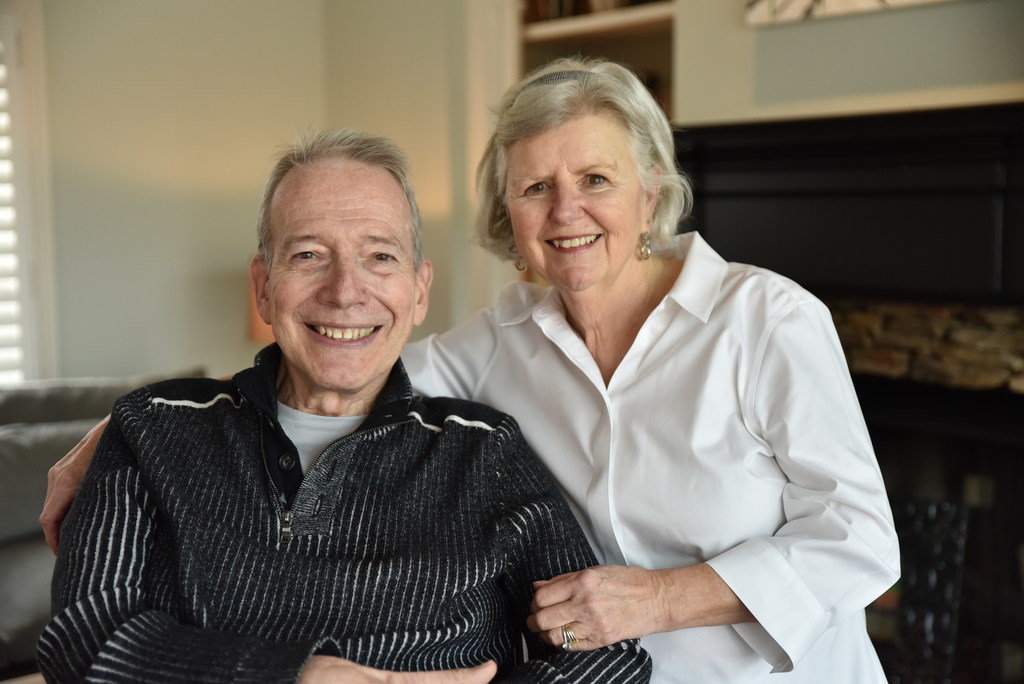In 13 years, MDA’s Night of Hope Gala, hosted every fall in Atlanta, Ga., has raised more than $9 million dedicated to funding critical research focused on treatments for amyotrophic lateral sclerosis (ALS).
And one of the event’s biggest champions is also one of the people it benefits most.
Ten years ago, Atlanta resident Ed Tessaro, then 62, was an athlete, a runner, a wilderness enthusiast. He was running in Bangkok, Thailand, in 2008 when he noticed his left leg wobbling. Less than a year later, he was diagnosed with spinal stenosis, a compression of the small spinal cord. But it was a false diagnosis; four months later, Ed saw a neurologist who told him he had ALS.
“It was a punch in the stomach, like it is to everyone,” Ed says. “I thought there was no way this could hit me, but when it did, you come down off that horse. You take stock of what you’re doing, what you’re thinking, what’s possible. And maybe in the course of six months, you decide you’re going to live. You’re not going to be the guy who’s dying. You’re going to be the guy that’s living.”

Upon diagnosis, Ed was immediately enrolled in a clinical trial happening at the time at Atlanta’s Emory University Hospital. He received two stem cell transplants into his spine’s grey matter, which required two surgeries — and a lot of time at Emory. While he was there, he met Holly and Palmer Proctor. Holly’s dad had been diagnosed with ALS in 2005, and in 2006, along with MDA, the Proctors had established the Night of Hope Gala to raise awareness of and funds for a cure for ALS.
The Proctors invited Ed to attend. And Ed did.
“Before long,” Ed says, “I was the chair, and the co-chair, and we’ve raised $9 million since that day.”
He’s quick to say the event is not a one-man show. It’s a big team, he says, and a big party. As a former Macy’s executive, Ed has turned to established corporate relationships and built new ones, bringing in sponsorships and auction items for the Night of Hope. He also became involved with a poker tournament hosted by MDA partner Mansfield Energy Corp. Mansfield had established the tournament, says Angela Simmons, executive director of MDA’s Atlanta office, but once the organizers met Ed, they renamed the event in his honor.
“To know Ed is to love Ed,” says Angela Simmons, Executive Director of MDA’s Atlanta office. “Called to be passionate about the cause through his ALS diagnosis, Ed serves a source of inspiration for our MDA staff, Night of Hope committee, and everyone he meets. His desire to fuel progress motivates others to join the cause and to become advocates of change and hope. There’s no barrier to his passion.”
Ed, who is now 72, has needed the place to direct that passion.
“It’s giving me a big old purpose in my life that I really enjoy,” he says. “I had retired years before, so I had the time to throw myself at it. And my family doesn’t have to carry around the ‘ain’t it awful’ syndrome that so often comes with this disease because there’s no cure, it’s always fatal. You can get pretty depressed pretty fast.”
Instead, Ed is the guy that’s living. ALS is a rare disease — “super orphan,” Ed says — so it’s also rare that people know someone living with it. But when people meet Ed, suddenly they do know someone living with ALS, and then they begin to understand the disease, and then, how vital research and clinical trials are, and then, how much work MDA has done, and does, to make ALS research and clinical trials possible.
Fundraising is successful, Ed says, when people feel connected. And it helps, too, he says, when they’re connecting while they’re doing something fun, like playing poker or bidding at the Night of Hope.

This year, as Night of Hope readies for its 14th year, Ed has had to take a step back. His symptoms have progressed; his speech has slowed a little, and he’s stopped driving. But he hasn’t slowed down in life, or in representing MDA and the ALS community. He’s traveling in June with his family to Florence, Italy, and he plans to appear at every ALS event he can. He’ll still be at the Night of Hope this year, making his own donation because, he says, it feels as good to be on the giving end as it does the receiving one.
ALS isn’t easy, Ed says. But it’s shown him different sides of himself, and the people he encounters.
“You can’t muscle your way through this,” he says. “You have to break yourself down the way a marine would be broken down at Parris Island and rebuilt for the battle you’re about to fight. It’s going to kill you and it’s going to be ugly and you have to manage how much of that you can tell somebody else. My advice to others is: Don’t turn inward.
“There’s no question I’d take my life back,” he says, “but what I’m very aware of is how much more I’ve gotten out of my life since I’ve been diagnosed. People who love me or know me or don’t know me yet, when they come into my life I see in them this wonderful willingness to give of themselves, something more than they would give had they not met a person with ALS. I’ve been the recipient of more love, more kindness. People intuitively want to do the right thing when they see someone in the position I’m in. There is an amazing gift that you get when your life is at risk that human beings are willing to offer.”
MDA’s 14th annual Night of Hope Gala is scheduled for Oct. 25, 2019. For more information, visit https://mdanightofhope.org. Find more information about MDA’s ALS-related events across the country throughout 2019 here.
